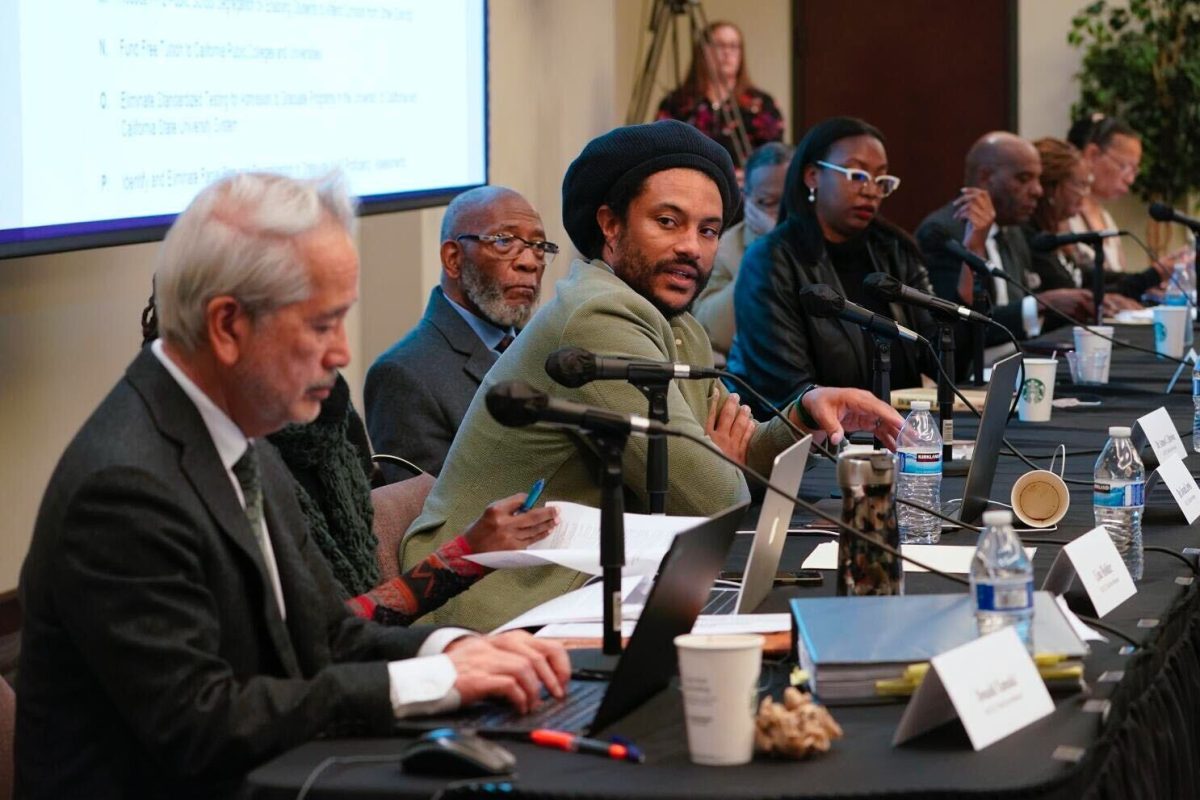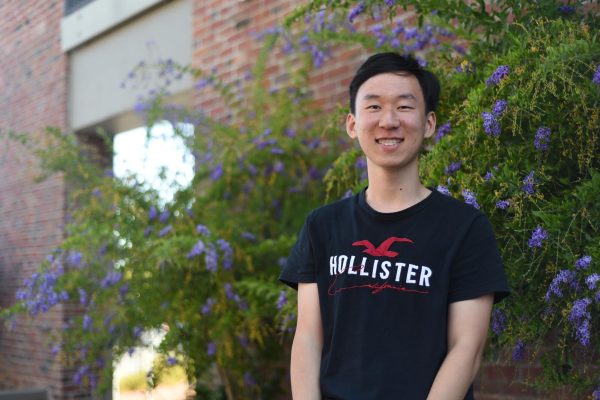The California Reparations Task Force proposed plans to provide reparations for African Americans in California with ancestors who were enslaved. According to California Reparations Task Force chairperson Kamilah Moore, the plan, released on June 29, 2023, is made up of 115 policy recommendations, one among them being cash reparations. In a 1,000-page final report, the California State Legislature will vote on the policies in January 2024.
Governor Gavin Newsom established the nine-member task force by signing Assembly Bill 3121 into law on September 30, 2020, to advise the California State Legislature on potential reparations proposals. Any California citizen could apply to be in the task force, with five people chosen by the Governor, two people chosen by the Speaker of the State Assembly and two people chosen by the Speaker of the State Senate.
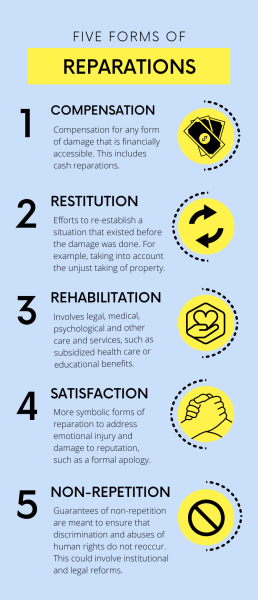
Moore, who currently works as an entertainment attorney, says that she applied to be part of the task force due to her experience in international law since the reparations plan had to comport with international human rights law standards. She states that although most people think of reparations as cash payments, there are four other forms of reparations, according to international law: restitution, rehabilitation, satisfaction and guarantees of non-repetition.
Moore states that the task force recommends cash payments in response to five historically state-sanctioned atrocities: health harms, unjust property takings, segregation and houselessness, mass segregation and policing, and devaluation of Black-owned businesses. Other recommendations also address the effects of oppression through various forms.
“Making Election Day a paid holiday was one of our recommendations to increase political participation because political disenfranchisement in the Black community is a thing,” Moore said. “That benefits everyone because everyone gets that day off work and gets to vote. For the more race conscious ones, one of our recommendations was the creation of Black wellness centers in Black communities to address systemic discrimination via mental and physical harm and neglect.”
Sophomore Ekundayo Davies, who is the Black Student Union president, says reparations are important for African Americans. He says that African Americans have been dehumanized as enslaved individuals and references the “40 acres and a mule” plan, where the U.S. government promised 40 acres of land to each newly freed African American family after the end of the Civil War. Davies emphasizes how the promise was never kept, as the plan ended up being rescinded after President Lincoln’s death.
“Their villages were burned down, and their families were killed,” Davies said. “Part of me says no amount of financial compensation can give back the amount of heritage that’s been lost. But the other part of me says there are certain things you can do.”
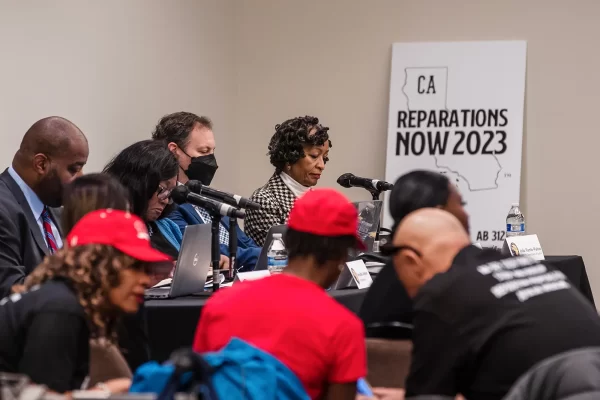
Davies believes that the reparations are something that Black civil rights activists have worked for. Having immigrated to the U.S. in 1970, Davies’ paternal grandfather organized sit-ins and protests at the canteen he worked at while attending college in Baltimore, Maryland. His grandmother was a nurse, and Davies says her experience facing racial prejudice as a student inspired her to fight for making the process of becoming a nurse more inclusive for Black women.
If the plan passes, Davies anticipates that people are more likely to stay in California even during a time of inflation and the rising cost of living. He also believes that it will be more likely for people to come to California.
“When you live in a community that’s willing to nurture and acknowledge your history and say, ‘Hey, we’re sorry,’ it’s easier to feel safe,” Davies said. “Personally, if I was in a situation where rents are going up and if I know that a state government is saying, ‘Hey, we see you,’ I’m going to feel more inclined to stay.”

However, Moore acknowledges that there have been arguments against the plan from the public. One particular issue is the plan’s effects on raised taxes and inflation. In response, Moore states that the plan will result in the eventual benefit for everyone in California. According to Moore, the task force hired five economists and public policy experts who estimated that 60,000 Black-owned businesses are missing from California due to discriminatory policies. The number was calculated by comparing the presence of Black-owned businesses in California to other states. The task force also calculated that this has resulted in losses of over 100 million jobs and a billion dollars in annual state revenue.
“There’s this pervasive anti-blackness in the state of California specifically, that has prevented Black folks in the state from being able to form firms, business firms and sustain them,” Moore said. “Our recommendation is to provide some form of compensation to descendants of slaves for the missing businesses, that is going to help not only descendants of slaves in the immediate sense but the entire state of California right now. In terms of the jobs, that will be for all Californians, not just Black folks. And the revenue from those missing Black businesses, over a billion dollars — that would help the state.”
Despite this, economics teacher Pete Pelkey believes that cash reparations being given may not have as significant of an impact as the plan proposes. He states that the benefits brought by the reparations will end up being temporary if people don’t spend the money wisely, resulting in the same situation that the state is already in. Pelkey adds that the reparations may have a long term effect to stimulate the economy, but with unemployment being historically low, adding the money into the economy will cause more inflation, resulting in higher prices. Instead, he proposes that the money should be more focused on education for the African American community.
“If you give a man a fish, he’ll eat for a day, but if you teach a man to fish, he’ll eat for a lifetime,” Pelkey said. “This is my proposal: every African American person who qualifies for college gets free college, no matter where you go, comped by the government, plus a salary while you’re in classes. If you’re getting paid to go to college, then you’re also going to have trained human beings, who are going to move up the social ladder, because they have job skills. That makes much more sense than throwing money at people. This is a talking point for politicians who never really plan to enact this.”
Although Davies admits that some may choose to squander their reparations money, he ultimately believes that decisions about how to spend the money should be made by the person who received it. Regardless, he says cash reparations would “inject a lot more money and investment in the Black community.”
“If you want to buy a house, get that house,” Davies said. “Get what your ancestors couldn’t. I hope that if and when this passes, it will go to a place that helps us further progress away from the whips and chains that were slavery and the whips and chains that still are held by racism.”
Pelkey states that to raise money for the plan, the state will have to sell bonds, driving it further into debt. According to Pelkey, California will be forced to raise taxes for future generations though it is already by far the state with the largest debt at 520 billion dollars.
“What happens in the long run, is when we have to raise taxes again to pay it back, I’m going to be dead,” Pelkey said. “My generation is going to be gone. It’s the young people of America that are going to have to clean up the mess that my generation created with that debt.”
Another issue that has been raised is the plan’s focus on African Americans in California, excluding the marginalization of other ethnic groups. Pelkey states that much of the California community from other ethnicities may respond with hostility towards the plan. In fact, a University of California, Berkeley IGS Poll showed that 59% of California voters oppose cash reparations compared to 28% who support it, with 13% having no opinion.
On the other hand, Davies does not believe that the plan ignores the struggles of other ethnic groups, as this may just be the first of many reparations plans to support minorities in California and the United States.
“Bias doesn’t have a color,” Davies said. “I don’t think it ignores anyone in any way, shape or form. It’s just one of the first movements towards a better America.”
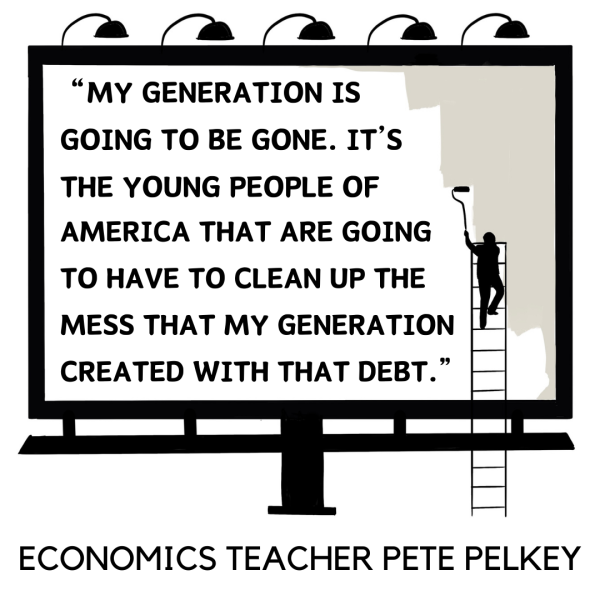
Moore, who would benefit from reparations for being a descendant of an enslaved individual, adds that the plan also includes a focus on other groups that have been historically oppressed in the state, such as the Latinx community in Zoot suit riots, or Japanese Americans who were prevented from buying property due to restrictive land laws. However, she believes that the African American experience in the U.S. has been unique in the degree of its struggles.
“We acknowledge that many groups have been marginalized and harmed, but tying back to what the late US Supreme Court Justice Thurgood Marshall said, the experience of those who are descended from slaves differs from other marginalized groups, not only by kind, but by degree,” Moore said. “We’ve been really the only group that had to deal with 256 years of forceful labor and enslavement with no restitution to account for it. Not only that, having to go through essentially 90 years of legal apartheid in this country and then, even after the so-called end of the legal apartheid with the Civil Rights Act of 1964 and the Voting Rights Act of 1965, this group is still reeling with the legacy of slavery in ways that other groups may not necessarily be.”
Moore admits that it is probably not possible to have all 115 recommendations introduced into legislation. However, she highlights Senate Bill 490, the first and currently only recommendation that has been introduced into legislation. Moore wrote SB490’s recommendation to create a new state agency for descendants of enslaved individuals.
“It pays homage to the Freedmen’s Bureau that once existed in this country,” Moore said. “The formal title would be the California American Freedman Affairs Agency. It would be the place where descendants of slaves would receive direct reparatory justice services in various different areas, from health to education, to business grants and housing grants. It’s going to be an agency that will provide direct compensation, if and when that becomes a political reality.”
Davies hopes that if the plan passes, it will make progress against the effects of historical racism as well as racism that is still present today. However, although he states that reparations are important to help the Black community, he emphasizes that prejudice and discrimination are still deeply rooted in our society.
“My little sister is 10 years younger than me,” Davies said. “She’s already asking questions like, ‘Why are we getting followed in stores?’ and ‘Why did we get pulled over for nothing?’ The plan will make a lot of people’s lives easier, but it will not erase anything that racism has done. I think having this money they’re giving back to the Black community will be great and fantastic, but I also think there’s still going to be bias in the police force, and there’s still going to be old-time ideals in Southern states. California doesn’t change a lot of the behaviors. It just gives us a little something as an apology.”




